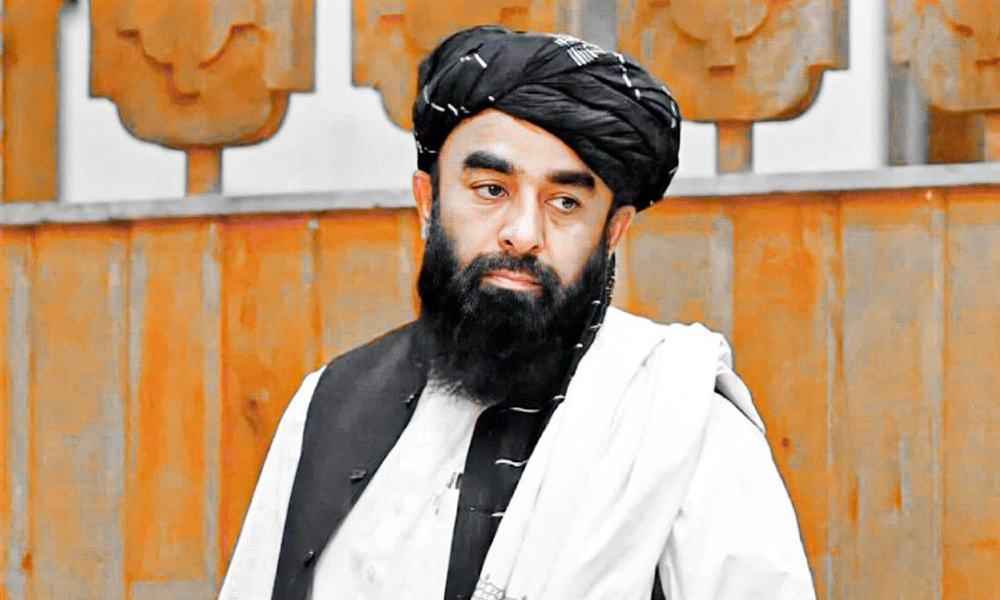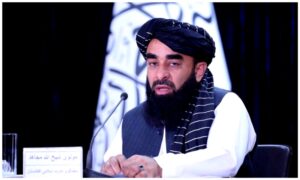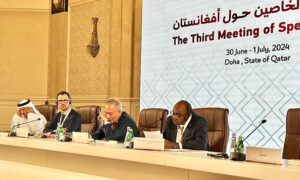Latest News
Mujahid sums up Doha meeting, says most countries willing to cooperate with Afghanistan
Speaking to Ariana News after the two-day meeting in the Qatari capital, Mujahid emphasized that the IEA was however adamant it would not allow any country to interfere in Afghanistan’s internal affairs.

Zabihullah Mujahid, the spokesman of the Islamic Emirate, told Ariana News that the IEA realized at the Doha meeting that most countries are willing to help and cooperate with Afghanistan.
Speaking to Ariana News after the two-day meeting in the Qatari capital, Mujahid emphasized that the IEA was however adamant it would not allow any country to interfere in Afghanistan’s internal affairs.
He also said “the patrolling of planes in the airspace of Afghanistan is a violation and we have condemned it, and we do not accept it for any reason.”
According to him, there are some internal matters that “people have the right to have demands from their system and government, but we do not want these demands to be made by other countries.”
He said that at the third meeting in Doha, two issues were discussed: how to help and cooperate with Afghanistan’s private sector, and identify the challenges; and secondly assess achievements and challenges in the fight against drugs.
“The issue of alternative livelihoods (to drugs) that is presented to the people is a very important issue because Afghans have suffered a lot in the fight against drugs and millions of dollars have been lost to the people and Afghans are poor people and there is unemployment in the society. It is too much, and for this purpose, an economic mechanism must be created.”
Meanwhile in a post on X, Mujahid said: “Afghans’ message reached all the participants.”
He added: “Afghanistan needs the cooperation of countries in the private sector, and the fight against drugs and creating alternative livelihoods; most countries discussed cooperation in this sector.”
The two-day UN-led Doha meeting on Afghanistan wrapped up on Monday.
This was the third meeting of its kind but the first that the Islamic Emirate attended.
Related Stories:
IEA calls on Doha meeting delegates to help resolve Afghanistan’s challenges
At Doha meeting, IEA delegation says policy differences are ‘natural’, urges lifting of sanctions
Latest News
Continued aid to Afghanistan vital for regional security: Kazakh president

Kazakhstan’s President Kassym-Jomart Tokayev has emphasized the continuation of humanitarian assistance to Afghanistan, stating that the ongoing provision of such aid plays an important role in ensuring regional security.
Speaking at the international conference “Peace and Trust” in Ashgabat, the capital of Turkmenistan, Tokayev described addressing complex humanitarian challenges and the reconstruction of Afghanistan as a necessity.
“To ensure regional security, we consider it essential to continue providing assistance to Afghanistan, including by strengthening international efforts to address complex humanitarian issues and the reconstruction of this country. Kazakhstan remains committed to supporting the people of Afghanistan through humanitarian aid, educational projects, trade development, and food security initiatives,” he said.
Meanwhile, experts believe that sustainable improvement of the humanitarian situation in Afghanistan requires broad cooperation from the international community and support for the country’s economic development.
“Investment can be defined as one of the fundamental drivers of the economic cycle, and whenever Afghan traders do not take their money out of the country and instead invest domestically, it naturally leads to greater growth and dynamism in Afghanistan’s economy,” said Abdul Zahoor Modabber, an economic analyst.
As the humanitarian crisis in Afghanistan continues, reports by international relief organizations indicate that millions of citizens of the country are in urgent need of food, health, and livelihood assistance.
The reduction in funding for aid organizations, the impacts of climate change, and the return of migrants have increased concerns about a further deterioration of the humanitarian situation in the country.
Latest News
Islamic Emirate declines to attend Tehran meeting on Afghanistan
Latest News
Sirajuddin Haqqani: A government that intimidates its people is not a true government

Khalifa Sirajuddin Haqqani, Minister of Interior of the Islamic Emirate of Afghanistan, said during a visit to Khost province on Friday that any government which rules through fear cannot be considered a true government.
“A government is one that is loved by its people, one that serves them with respect and compassion, and from whose behavior people learn ethics and sincerity,” he said.
Haqqani also stressed that Afghans who opposed the Islamic Emirate in the past should be tolerated and treated in a way that helps eliminate hostility and animosity, paving the way for national cohesion.
-

 Latest News2 days ago
Latest News2 days agoMuttaqi: Afghanistan’s progress requires both religious and modern education
-

 Sport4 days ago
Sport4 days agoILT20: Desert Vipers edge Gulf Giants in historic super over thriller
-

 Regional4 days ago
Regional4 days agoSix Pakistani soldiers killed in TTP attack in Kurram District
-

 Business4 days ago
Business4 days agoTrade bodies warn almost 11,000 Afghan transit containers stuck at Karachi port
-

 World4 days ago
World4 days agoPowerful 7.6 earthquake hits northern Japan, tsunami warnings issued
-

 Latest News3 days ago
Latest News3 days agoTrump calls Afghanistan a ‘hellhole’ country as US expands immigration restrictions
-

 Sport3 days ago
Sport3 days agoCommanding wins for Arman FC and Sarsabz Yashlar in Afghanistan Champions League
-

 Latest News5 days ago
Latest News5 days agoPakistan’s top general calls on IEA to pick between ties with Islamabad or TTP



























